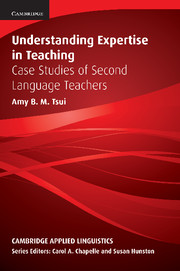Book contents
- Frontmatter
- Contents
- Series Editors' Preface
- Acknowledgments
- Chapter 1 Introduction
- Chapter 2 Conceptions of Expertise
- Chapter 3 Characteristics of Expert and Novice Teachers
- Chapter 4 Teacher Knowledge
- Chapter 5 The Case Studies
- Chapter 6 The Professional Development of the ESL Teachers
- Chapter 7 Teacher Knowledge and Managing the Classroom for ESL Learning
- Chapter 8 Teacher Knowledge and the Enactment of the ESL Curriculum
- Chapter 9 Taking on the Challenge: Exploring Process Writing
- Chapter 10 Understanding Expertise in Teaching
- Appendix 1 Reader's Comment Form on First Draft for the Second Writing Task (Angel's First Draft)
- Appendix 2 Learner Training in Making Revisions
- References
- Index
Chapter 3 - Characteristics of Expert and Novice Teachers
Published online by Cambridge University Press: 05 October 2012
- Frontmatter
- Contents
- Series Editors' Preface
- Acknowledgments
- Chapter 1 Introduction
- Chapter 2 Conceptions of Expertise
- Chapter 3 Characteristics of Expert and Novice Teachers
- Chapter 4 Teacher Knowledge
- Chapter 5 The Case Studies
- Chapter 6 The Professional Development of the ESL Teachers
- Chapter 7 Teacher Knowledge and Managing the Classroom for ESL Learning
- Chapter 8 Teacher Knowledge and the Enactment of the ESL Curriculum
- Chapter 9 Taking on the Challenge: Exploring Process Writing
- Chapter 10 Understanding Expertise in Teaching
- Appendix 1 Reader's Comment Form on First Draft for the Second Writing Task (Angel's First Draft)
- Appendix 2 Learner Training in Making Revisions
- References
- Index
Summary
In the previous chapter, I reviewed three major theories of expertise and their delineation of the characteristics of experts across skills and disciplines. In this chapter, I shall examine the characteristics of novice and expert teachers that have been identified in the literature on teaching expertise and see to what extent they share the characteristics of novices and experts in other professions.
Studies of expertise in teaching mostly took the form of novice-expert comparisons. They drew on studies of teachers' mental processes in planning and decision-making, which were seen as a link between thought and action, and were heavily influenced by an information processing model of the mind in cognitive psychology (see Calderhead, 1996). In some studies, laboratory tasks were designed, and elicitations of teachers' thought processes were conducted. In other cases direct observations of classroom teaching and stimulated-recall interviews were used. Most studies comparing expert and novice teachers focused on their cognitive processes in different phases of teaching, taking on board the distinction made by Jackson (1968) between ‘preactive’ and ‘interactive’ phases of teaching. The former refers to the period before teaching, when teachers are planning the lesson and evaluating and selecting teaching methods and materials. The latter refers to the time when teachers are interacting with students in the classroom. Jackson pointed out that there are qualitative differences in what teachers do in these two phases. Clark and Peterson (1986) proposed a third phase, the “postactive” phase, to describe the period when teachers reflect on their teaching after a lesson and make decisions about subsequent teaching.
- Type
- Chapter
- Information
- Understanding Expertise in TeachingCase Studies of Second Language Teachers, pp. 22 - 41Publisher: Cambridge University PressPrint publication year: 2003



